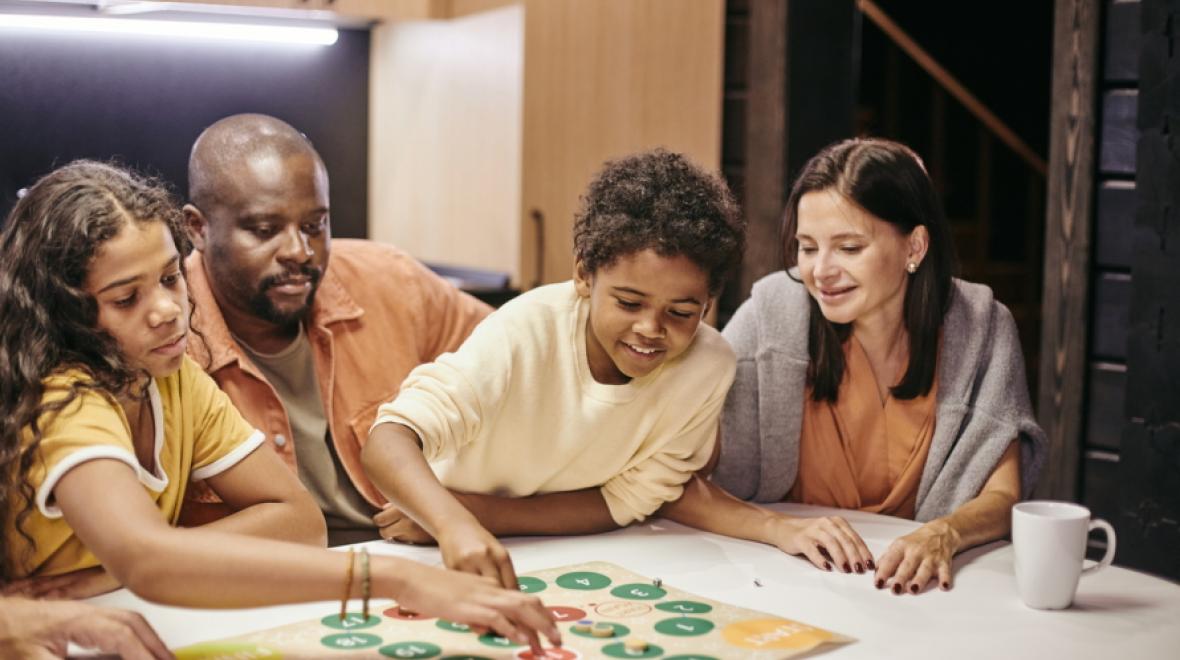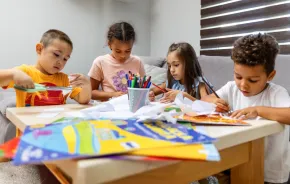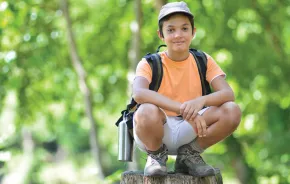
As the cold weather brings families indoors, now is the perfect time to dust off those board games and have a family game night. But just because it’s play time doesn’t mean you can’t sneak in some learning, too. These 10 games are perfect for making game night fun and secretly educational!
1. Exploding Kittens
Type: card game
Number of players: 2–5 players
Recommended ages: 7 and older
Playing time: 15 minutes
Skills to learn: strategy
A favorite among families, Exploding Kittens is a game where players draw cards from a deck while attempting to avoid the dreaded exploding kitten cards. Players can play cards in their hand to diffuse the exploding kittens or invoke actions on other players.
Exploding Kittens is a terrific way to teach strategic planning. Seattle mom, Annette de Soto, and her daughter, Arya, both love Exploding Kittens’ “strange card drawings" and they also “relish its weirdness.”
2. Sushi Go!
Type: card game
Number of players: 2–5 players
Recommended ages: 8 and older
Playing time: 15 minutes
Skills to learn: math and strategy
Sushi Go! is a pick-and-pass card game where players build combinations of sushi to score points. Players must choose cards in their hand to play, then pass their hand to the next player.
Megan Kamakura, a mom of two from Buckley, Wash., loves using Sushi Go! as a math learning tool. “It’s a game that requires some strategy while also helping our kids with their speed math skills,” she says.
3. Stack The Scoops
Type: card game
Number of players: 2–6 players
Recommended ages: 5–10
Playing time: 15–45 minutes
Skills to learn: addition and multiplication
Another game that reinforces math skills is Stack The Scoops, an ice-cream-themed game where players create sets of ice cream to earn points. Sets consist of a base, a scoop and a topping card. Players can double or triple their points with double or triple scoop cards. Stack The Scoops was created by local game publisher, ViBuGo, which, in full disclosure, is co-owned by this author.
4. Space Team
Type: card game
Number of players: 3–6 players
Recommended ages: 10 and older
Playing time: 5 minutes
Skills to learn: communication
Fans of raucous games will enjoy Space Team, a cooperative game where players must work together to build a spaceship while solving problems using tool cards distributed among the players. Space Team is a fantastic game for developing communication skills as players must talk to each other — shouting phrases like “I need a Depthgrater!” or “where’s the Holospindle!” — to gather the tools they need.
5. Finders Seekers
Type: activity pack
Number of players: 1–8 players
Recommended ages: 10 and older
Playing time: at least 30 minutes
Skills to learn: problem-solving
Another exciting problem-solving game is Finders Seekers, a mystery game that families can do at home. In Finders Seekers, players collaborate to solve a mystery set in another country.
Becca Campbell, a mom from Lacey, Wash., loves how Finders Seekers encourages out-of-the-box thinking. “Our kid’s brain is differently wired,” she explains, “and it’s fun to see how he solves the puzzles.”
6. Azul
Type: board game
Number of players: 2–4 players
Recommended ages: 8 and older
Playing time: 30–45 minutes
Skills to learn: spatial awareness and patterns
Creative-minded families will love Azul, where players must arrange wall tiles for the Royal Palace of Evora in Portugal. The tile designs are inspired by the Moorish architecture of southern Spain. Players earn points by creating various tile arrangements, and the player with the most points wins. Azul is perfect for reinforcing skills in spatial awareness and pattern recognition.
7. Cascadia
Type: board game
Number of players: 1–4 players
Recommended ages: 10 and older
Playing time: 30–45 minutes
Skills to learn: Pacific Northwest nature knowledge
A new game set in the Pacific Northwest is Cascadia, created by local game designers Flatout Games. In Cascadia, players create habitats for wildlife found within the region. Players earn points based on the spatial arrangement of wildlife, as well as combinations of habitats.
This game is a wonderful way to introduce kids to the Pacific Northwest. Additionally, it inspires families to explore the natural diversity of the region.
8. Evolution
Type: board game
Number of players: 2–6 players
Recommended ages: 12 and older
Playing time: at least 60 minutes
Skills to learn: evolutionary concepts
A fun game for science lovers is Evolution, where players create animals using traits that will help them survive. Players can choose traits for their animal, such as a protective shell, the ability to jump, speed or scavenging behavior.
Evolution is an excellent way to help children understand evolutionary concepts. This game encourages them to see how animals naturally evolve based on surrounding predators and prey.
9. Mariposas
Type: board game
Number of players: 2–5 players
Recommended ages: 14 and older
Playing time: 45–75 minutes
Skills to learn: monarch butterfly migrations
Another creature-themed game is Mariposas, by the designer of Wingspan. In Mariposas, players migrate butterflies from Michoacan, Mexico, to Canada and back within four seasons. Players earn points by visiting checkpoints or hatching new butterfly generations.
Mariposas beautifully introduces kids to monarch butterflies and helps them learn about migration patterns.
10. Ravine
Type: card game
Number of players: 3–6 players
Recommended ages: 10 and older
Playing time: 20 minutes
Skills to learn: cooperation and negotiation
Cooperation is a useful skill for kids to learn, and Ravine is perfect for teaching it. In Ravine, players are survivors of a plane crash and must work together to forage for food, build a fire and establish shelter.
“Our kids really enjoy negotiating and bartering with each other to see what moves they should make,” says Seattle dad Karol Szygorski. For his kids, playing Ravine helps instill important teamwork and decision-making skills.
For your next family game night do more than just play with your kids. Learn with them, too!
More brilliant board games: |















